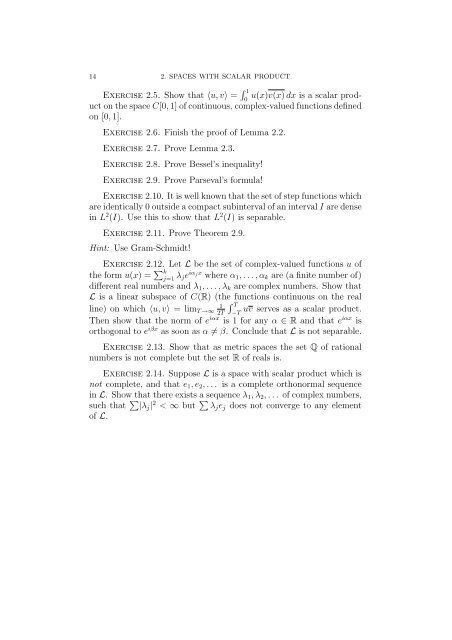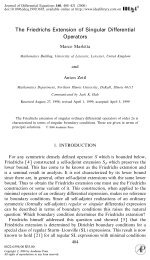Spectral Theory in Hilbert Space
Spectral Theory in Hilbert Space
Spectral Theory in Hilbert Space
You also want an ePaper? Increase the reach of your titles
YUMPU automatically turns print PDFs into web optimized ePapers that Google loves.
14 2. SPACES WITH SCALAR PRODUCT<br />
Exercise 2.5. Show that 〈u, v〉 = 1<br />
u(x)v(x) dx is a scalar prod-<br />
0<br />
uct on the space C[0, 1] of cont<strong>in</strong>uous, complex-valued functions def<strong>in</strong>ed<br />
on [0, 1].<br />
Exercise 2.6. F<strong>in</strong>ish the proof of Lemma 2.2.<br />
Exercise 2.7. Prove Lemma 2.3.<br />
Exercise 2.8. Prove Bessel’s <strong>in</strong>equality!<br />
Exercise 2.9. Prove Parseval’s formula!<br />
Exercise 2.10. It is well known that the set of step functions which<br />
are identically 0 outside a compact sub<strong>in</strong>terval of an <strong>in</strong>terval I are dense<br />
<strong>in</strong> L 2 (I). Use this to show that L 2 (I) is separable.<br />
Exercise 2.11. Prove Theorem 2.9.<br />
H<strong>in</strong>t: Use Gram-Schmidt!<br />
Exercise 2.12. Let L be the set of complex-valued functions u of<br />
the form u(x) = k j=1 λjeiαjx where α1, . . . , αk are (a f<strong>in</strong>ite number of)<br />
different real numbers and λ1, . . . , λk are complex numbers. Show that<br />
L is a l<strong>in</strong>ear subspace of C(R) (the functions cont<strong>in</strong>uous on the real<br />
uv serves as a scalar product.<br />
l<strong>in</strong>e) on which 〈u, v〉 = limT →∞ 1<br />
2T<br />
T<br />
−T<br />
Then show that the norm of e iαx is 1 for any α ∈ R and that e iαx is<br />
orthogonal to e iβx as soon as α = β. Conclude that L is not separable.<br />
Exercise 2.13. Show that as metric spaces the set Q of rational<br />
numbers is not complete but the set R of reals is.<br />
Exercise 2.14. Suppose L is a space with scalar product which is<br />
not complete, and that e1, e2, . . . is a complete orthonormal sequence<br />
<strong>in</strong> L. Show that there exists a sequence λ1, λ2, . . . of complex numbers,<br />
such that |λj| 2 < ∞ but λjej does not converge to any element<br />
of L.



